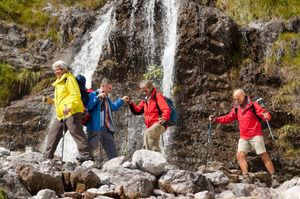 Having an accident is always a worry and can be difficult to deal with, but having an accident abroad means having to cope with a lot of extra problems. From medical costs to access to services, quality of services and potential difficulties in getting home, it can be exhausting.
Having an accident is always a worry and can be difficult to deal with, but having an accident abroad means having to cope with a lot of extra problems. From medical costs to access to services, quality of services and potential difficulties in getting home, it can be exhausting.
Careful planning, however, makes all this a lot easier. Knowing that a minor accident won’t turn into a crisis makes it much easier to set those worries aside.
Before leaving
Anyone traveling to a foreign country should first make sure they are properly insured – both for the journey (because it can cost tens of thousands of dollars if an in-flight medical emergency leads to a plane having to be rerouted) and for the time that they will be spending in another country. Some health insurance policies already cover foreign travel but even these can have odd exemptions or limitations, so it’s worth reading the small print. In other cases, it may be necessary to buy an add-on policy.
It’s also a good idea to arrange a source of emergency funds in case they are needed, and to learn some emergency phrases for explaining possible medical needs. Medication should be kept in its original packaging and it’s worth getting a doctor’s letter to explain what it is and why it’s needed. Travelers should be aware that their prescription meds could be illegal in some countries, but in that case a doctor may be able to arrange an alternative.
It’s important to get all the vaccinations recommended for a particular country in plenty of time before setting off.
Common kinds of accident and injury
The most common kinds of accident abroad are much the same as those at home – car accidents, trips and falls. In addition, travelers face an increased risk of sunburn and sunstroke (which can potentially lead to serious problems like heart attacks and strokes) and food poisoning.
Getting help
Almost every country has some kind of emergency ambulance service, so it’s important to know the number to call it on. If unable to speak the local language and dealing with an operator who can’t speak English, it can help to repeat the location where the accident has happened.
Most hospitals have somebody who can speak English, but anyone with a long-term health condition should have the details written down so a doctor can look them up. This can also be helpful in a pharmacy. If given a prescription, it’s best to get it filled at the hospital itself if possible, or at a major pharmacy in a city, as smaller pharmacies in some countries have quite limited stock, while some may try to sell fake or out-of-date drugs.
People under the care of healthcare specialists should carry contact details with them so that these can be shared with local doctors in the event of something going seriously wrong.
It’s always best to pay with a credit card rather than cash, so as to have a reliable receipt.
Compensation
Keeping receipts for both treatment and related travel make it possible to claim compensation if the accident was someone else’s fault. A local police report is also needed in most cases.











